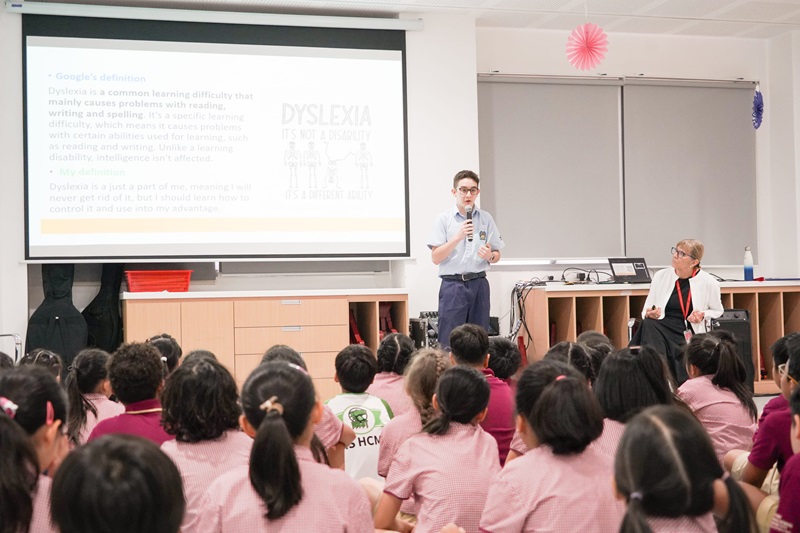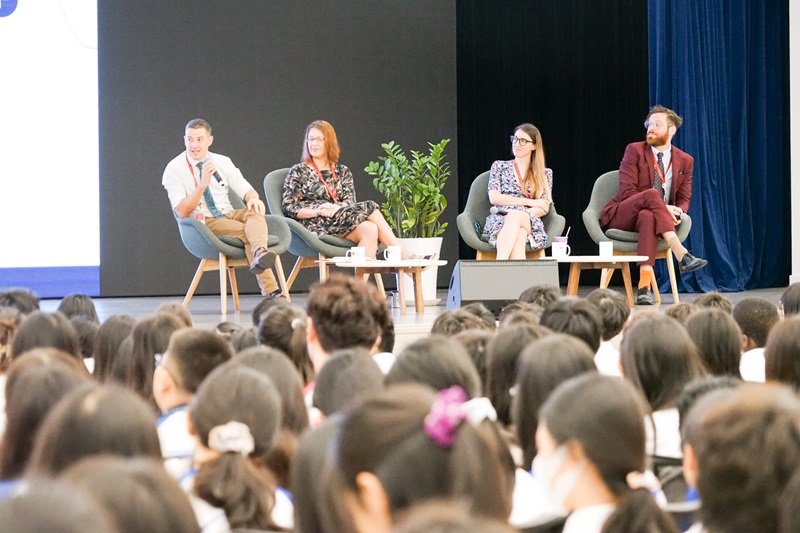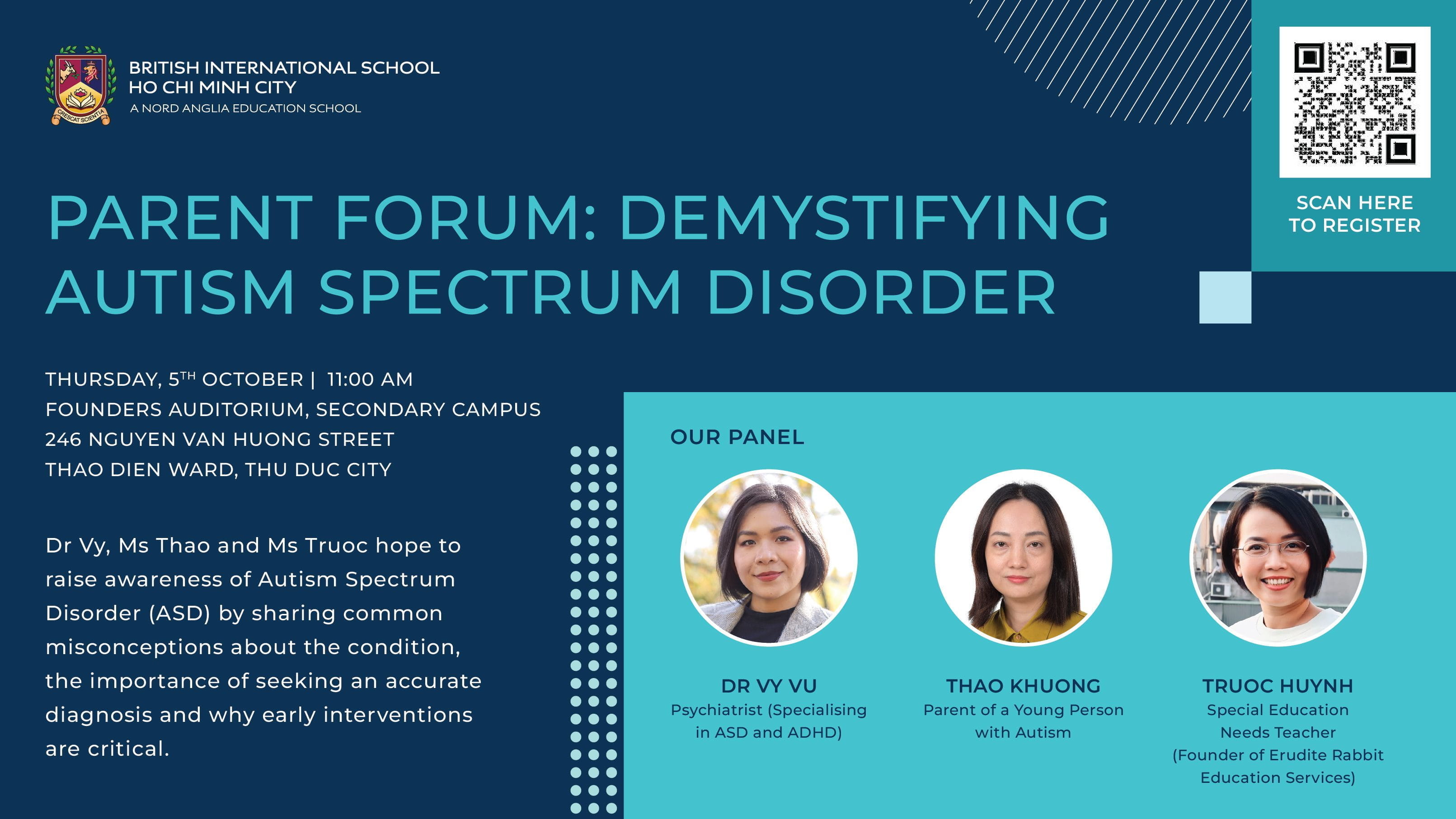At BIS we celebrate the idea that all minds are different. We know that differences bring challenges, but also add great richness to our community. The 2nd of October marked the start of Neurodiversity Week at BIS, across all campuses.
During Neurodiversity week, we facilitated activities to highlight our key message that “All Minds Belong”.
Throughout the school, students and staff shared their experiences and students engaged in discussions about neurodiversity and the idea that different people view the world in a variety of ways. We have examined the challenges and strengths within neurodiversity and celebrated all minds at BIS!
What is neurodiversity?
Neurodiversity embraces the idea that there are many differences in the way people’s brains work, perceive and respond to the world; none are ‘correct’ or ‘incorrect’.
It is thought that about 15–20% of the population is neurodiverse. This includes up to 10% of people who are diagnosed with dyslexia, 6% with dyspraxia, 5% with ADHD and 1–2% with autism, as examples of some forms of neurodivergence.
Being neurodivergent does not mean being ‘less than’. In fact, there are many examples of success, such as gymnast Simone Biles, actors Ryan Reynolds, Jennifer Aniston and Daniel Radcliffe, singer Billie Eilish and entrepreneurs such as Elon Musk, Walt Disney, Richard Branson and IKEA founder Ingvar Kamprad.
It is also important to recognise that within our school family, pupils, staff and parents there will always be a neurodivergent population, with, or without a diagnosis.
.png?h=546&w=650&rev=709f9d64f1124de4be447c9448e32a9f&hash=AF91A1F14282567D3829890D6E8FBECD)
An inclusive learning environment
We therefore need to foster an environment where we delight in difference, teaching care and understanding to those around us. Practically, we can make accommodations where they are needed. Examples would be; extra time in an exam, movement breaks, a quiet space at break time, lunch club for those who find lunchtimes too noisy, or visual aids to help with memory. In this way all are able to achieve their maximum potential, feeling supported in doing so.
Throughout our curriculum, our students have opportunities to succeed in many spheres, such as drama, music, sport, art, science, and wellbeing, thus allowing students with different learning styles to achieve success.
Sharing experiences and raising awareness
Some of the most powerful parts of Neurodiversity Week were the neurodiverse voices we heard from in our community; our students, staff and parents shared their own stories and strategies.
Years 5 and 6 welcomed two students from Years 12 and 13, Rodrigo and Erwan to discuss their experiences with Dyslexia.
They shared their top strategies for overcoming their challenges and answered some very insightful questions from students including “As a neurodivergent person, can you spot other neurodivergent people more easily?” and “Did you ever have a time where your dyslexia affected your confidence?”

Some of the strategies shared for Dyslexia included:
- Using a ruler to keep your place whilst reading
- Using a watch to time yourself and keep track of progress
- Having a support network around you made up of friends, family and teachers
As Primary Head of Learning Support, I had the opportunity to share with Year 6 on “ADHD and me” having recently been diagnosed. For me, this insight was particularly important, as in the past ADHD has mostly been associated with males and mostly within childhood. Experts now believe that many females present differently, with most of their hyperactivity happening inside their own heads.
I was able to share a number of my own personal strategies for managing ADHD, which may not work for everyone but could be valuable tips, including:
- Writing everything down to organise your thoughts
- Taking time to balance and recharge through exercise and rest
- Asking for help when needed!
We also heard from a panel of teachers who spoke to students in their weekly assemblies about the challenges they experience and the strategies they use to manage and be successful at work.

All students in Secondary have a Wellbeing lesson every week. Our wellbeing curriculum comprises a range of activities that are specifically designed to keep our students' minds and bodies healthy to support the growth of our students both socially and emotionally.
During this unique week every wellbeing session focused on neurodiversity. Our students in Years 7 – 9 were given a task to research famous neurodiverse people and to create a poster about them. We look forward to seeing their final creations! Whilst our Year 10 to 13 students discovered the importance of the right learning environment, after completing an eye-opening task of what it might be like to be dyslexic and without the right tools available. They then looked at the challenges of being neurodivergent and what adjustments and accommodations we can all make to support neurodivergent people.
“The Neurodiversity Week assembly gave students and staff alike a chance to learn about the Neurodiversity that we have in our school community. It was very powerful to listen to staff members discuss the challenges they faced when they were at school and to see students consider this. The follow up Well-being lessons gave students an opportunity to explore these issues in more depth. What a great way to celebrate the diversity within the BIS community!” - Dominic Cheng, Head of Wellbeing (KS3 & KS4)
The week culminated with an event on Thursday, where teachers, parents and professionals from across HCMC were invited to a forum on “Demystifying ASD”: The forum which was led by our panel, Psychiatrist Dr Vy, alongside Ms Thao, a parent of a child with Autism and Ms Truoc, a Special Needs Educator.
.jpg?h=533&w=800&rev=b461481c86444d9aba427775497b7560&hash=6B79F9EA3B646B68609FC7587B164613)
Held in both English and Vietnamese, this interactive forum gave all parents and professionals from around the city the opportunity to share their understanding, worries and feelings surrounding neurodiversity. It was very powerful to see this shift of awareness and openness surrounding neurodiversity, where in Vietnam and some other Asian countries the topic has been somewhat taboo in the past. Dr Vy and her panelists carefully broke down the myths and stigmas surrounding neurodiversity and we celebrated the strengths that these differences bring too.
BIS HCMC has also been instrumental in working with other schools in our Nord Anglia family, to develop training and resources for all staff members. Many neurodivergent people hide or ‘mask’ their differences in public, which can lead to exhaustion and meltdowns at home. Demystifying learning differences such as Autism, Dyslexia and ADHD, helps us to understand and support students, allowing them to be their wonderful selves.
Following neurodiversity week, our primary campuses are now taking part in Healthy Me week, to celebrate all aspects of health. The week began with a whole campus Zumba dance party on Monday morning and our classes have been taking part in a variety of activities including smoothie making and yoga.





.png?h=546&w=650&rev=709f9d64f1124de4be447c9448e32a9f&hash=AF91A1F14282567D3829890D6E8FBECD)
.jpg?h=533&w=800&rev=1afe898ef0cf402bb4c40b9541d3ea5d&hash=F600D18AA872F71067A19B71A9B77AAD)

.jpg?h=533&w=800&rev=6a9fbec0b0324822a7e18254aa1748aa&hash=08E7A2E7CAFC9D28DD63E02EDB70F963)

.jpg?h=533&w=800&rev=b461481c86444d9aba427775497b7560&hash=6B79F9EA3B646B68609FC7587B164613)
.jpg?rev=c7fc442d6ba54eef89c7c1dc78935b20&hash=F7385872EBADCA0D2D7B50F73007EFE4)






.jpg?h=667&iar=0&w=1000&rev=bf4cc37cb2244a9a9fe0521928afe0e9&hash=CE567187AD54C8FB6899920948A3E8E1)
